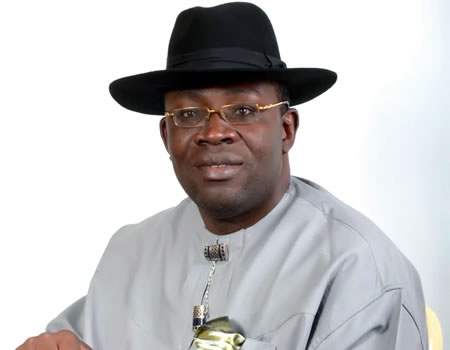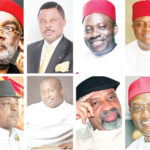Former Bayelsa State governor and senator representing Bayelsa West, Seriake Dickson is a member of the Senate Committee on the Independent National Electoral Commission, (INEC). He speaks on the controversial amendment of clause 52(3) in the passed Electoral Act (Amendment) Bill, 2021, provision of three percent funding for Host Communities Trust Fund, as proposed in the Petroleum Industry Bill (PIB) and other issues. TAIWO AMODU brings the excerpts:
Can you give us your general appraisal of the Petroleum Industry Bill (PIB) and the Electoral Act Amendment Bill passed by the Senate before it proceeded on recess?
The late President Umaru Yar’Adua sent the first PIB to the National Assembly. The PIB work started from Obasanjo’s time; that was when the idea was muted and during Yar’Adua, the late Dr Rilwanu Lukman, was petroleum minister when this bill came. This bill proposed 10 percent for host communities and also proposed 10 percent for frontier development but unfortunately, it could not be passed. We are happy; the people are happy that the National Assembly has been able to break that jinx or whatever looks like it, I mean the PIB but we must get it right. As you know I disagree completely and most of us disagreed with the three percent equity for the host communities that was eventually passed. Of course, you know the history, the Senate passed three percent equity and the House five percent and they went for a conference which came up with three percent.
But, this country is not helping itself; it is not helping investors and it is not helping host communities by not creating the enabling environment that would allow investment to thrive.
The argument that anything more than three percent investors will not come and so what. If the host communities are not happy would investors come? If they don’t have a stake in exploration and exploitation activities, the investors they are trying to bring, by whatever means they come, once they find that the situation is not conducive, they will take off and it is not a wise decision because you are not dealing with only one community but thousands, hundreds of communities.
Don’t forget that now even the transit communities have a stake. I know that people are arguing why pipeline communities should be part of it but there is sense in that, because if you exclude the pipeline communities, they can sabotage the entire management of the operations. So, it is a question of percentage.
It’s a question of a proper discretion at the level of management of the host communities’ fund. So, a lot of skill has to be deployed in the actual management of the host communities’ Fund. The world knows, these host communities know that at the beginning of this bill, what was proposed was 10 percent for them and no one is engaging them; no one is explaining anything to them. All they have seen is that people, who say they have majority votes, have imposed a three percent equity on them and they are angry.
That is why I am of the view that this three percent that the National Assembly has passed is not helpful to the host communities.
It is not helpful to the oil companies; it is also not helpful to the country because if we want to attract investment, then we must all work hand in hand with the host communities; get their buy-in; get their understanding; get their support and first create an enabling environment for investment to thrive.
So, I believe that it is not too late to make a change. There is still room for a review of this so that we can have the buy-in of the oilproducing communities.
I also made a case that there is nothing wrong about appropriating money; giving money for the development of the Frontier basins but should it be up to 30 percent?
Frontier basins are several in the country. I know that it serves everybody’s interest, it serves the national interest in exploring more basins. There is the Gongola basin, the Benue area, the Sokoto basin, the Dahomey, Ogun, Anambra and so on. Nobody is against that, but when oil-producing communities here taking three percent, NNPC funds of 30 percent profit is being allocated to exploration and they have been denied even five percent, not even 10 percent. It is not a very helpful situation for the oil industry. You all know how we felt. I had to stage a walkout because that was the right thing to do. We didn’t want our names to be in that kind of activity and that is about it. Some were asking me why the walkout. Why not the walk out! That is a normal parliamentary practice.
When you disagree, you make a point. The second one has to do with the Electoral Act Amendment Bill and you have seen the backlash, first as a member of the committee.
The members did a good job in presenting that draft, which should have taken care of all the controversies that are now being raised. That draft would have enabled INEC to transmit electronically where and when practicable they felt the technology available would make it possible for that to be done. It took care of all the concerns and some of the complaints the members raised even at the level of the committee and we pushed them through and everyone agreed. Now, you can see the attacks on the National Assembly; the attacks on the Senate especially. What I want to say is that there is a marked difference between what we passed in the Senate and what the House passed from the report I am reading. If that is so, then there is likely to be a conference committee on it. While casting my vote for electronic transmission of results, I made it very clear that it is unconstitutional for the National Assembly, for any arm, for anybody to subordinate the independence of and operational powers and discretion conferred by the constitution on INEC. You can’t subordinate INEC to any other body. It is not constitutional. If that ends up as the position of both chambers, you can be very sure what the likely decisions of the courts will be. This is why you have the executive and you have the judiciary.
Laws that are passed that are inconsistent with the constitution will be challenged.
Like I said on the floor, it is unconstitutional to subject the operational independence of INEC to another agency; to report to another agency no matter how technical, no matter how highly placed that agency may be. I thought we should make that clear that there is still room for further legislative work and that Nigerians should not lose hope. It is gratifying to see that Nigerians love democracy and they are excited about voting and their expectation is that they want their votes to count and their votes to be counted and I believe that the National Assembly exists to make that possible, not to hinder it. I thought I should also clarify on that.
How do you feel about the passage of the PIB, since in the sixth Assembly, late Yar’Adua proposed 10 percent for host communities and incidentally that time the Minister of Petroleum, the late Rilwan Lukman was from the North. Now, your predecessor, Timipre Sylva is the Minister for Petroleum; he brought the 2.5 percent proposal?
Well, I think a number of these questions need to be directed to the Minister of Petroleum but you know the government position was 2.5 percent and he came to present the Government position. So you ask him how he feels about it. Of course, we felt bad that is why I voted against it. This is not the first time President Muhammadu Buhari is presenting this bill. President Buhari’ first proposal was five percent. That is why I said that this matter has been so badly mismanaged.
So, with better advice and strategic thinking, they should have kept at that five percent and discuss with the oil companies. For example, the oil companies still carry out Corporate Social Responsibility (CSR) activities.
So, you can engage them and ask what the cost of their CSR, build it into this, after all, the percentage is part of the operating cost. So, if you remove the CSR, hospitals, schools, some of them they are not even usable but they award contracts which gulp a lot of money. If you say look, factor all of that into the host communities fund, because the fund is for the development of the host communities, you will see that you will even get more than five percent.
That is why I said at the executive level, this bill has been strategically mismanaged with respect to the management of the host communities because it will raise security investments because the Nigerian security forces would be overworked. They will need money to work and all of these is an additional cost you are not factoring in. Meanwhile, if you say five percent, and the oil-producing com munities are on the same page with you, you have a secured stable environment. This bill has a clause that if there is any damage to any facility that is not natural, that that fund will be utilised in fixing it. So the idea of this fund is to also give the host communities responsibility for the stability and safety of facilities. So, the host communities are the most important partners. The danger is that because of this strategic mismanagement, the host communities are now being alienated and you are dealing with banditry that you have not conquered; you are dealing with kidnapping you have not conquered; you are dealing with Boko Haram for 10 years, terrorising everybody and the security forces are still battling. You want to open another chapter in over eight states or more, in communities where majority of our people reside, most of them remote that have very little Federal Government presence.
No security presence! I think that the host communities and the people should have been placed as the number one partners for stability and for development of the oil-producing areas in order to guarantee sustainability in this critical industry without which the national economy will collapse. This is why I disagreed with the strategic mismanagement.
So, direct your questions to the petroleum minister and the group managing director of the NNPC, especially the petroleum minister. He will answer why President Yar’Adua proposed 10 percent; President Buhari proposed five percent earlier and why him from Bayelsa came to the National Assembly to present 2.5 percent.
On the electoral act amendment bill, the chairman of your Committee on INEC, Kabiru Gaya, voted against your report. How do you feel?
You asked about the vote that was cast by my chairman, Senate Committee on INEC. He is my good friend with whom I disagree completely on this as you know. Again, I think you should direct your question to him and I will also be interested in listening to his reply; why the chairman of our committee who agreed with us at the committee level when we were crafting voted against our collective decision? I moved this clause, framing it to accommodate the concerns of some members, who doubted connectivity in their communities. That is why you see the difference between what we presented and that in the House because of those concerns which were generally the same concern they cited; we said where and when practicable and everybody agreed and I thought that we had addressed that concern. The underlying reason is that you cannot take away the professional judgment and discretion of INEC.
We are not technical people and that is why you see conflicting reports from NCC and so on and so forth. The agency that we should trust and rely on as to whether they can conduct or transmit results electronically is INEC. So, we said give them that discretion. That is why it was phrased that way.
As a former House member, later a governor and now a senator, would you say the legislature is oppressive? What do you think should be done to overcome this oppressive legislature?
First of all, don’t cast aspersions on the legislature. I am not here to say that the Senate and the National Assembly should be cast in the way and manner that you are doing.
We can disagree with the legislation which is what we are doing but that characterisation for me is too broad. For instance, it is the Senate that raised it from the 2.5 percent the executive presented. It is now three percent.
All we are saying that it is not enough. In nation building, particularly in a vast and diverse nation relying on might, relying on majority does not build a nation. Majority votes, strength and numbers on their own do not build a country. What builds a nation in a diverse society like ours is the presence of justice, fairness; a nation that protects the weak from the strong; a nation that also exists for the few, as well as the many. That is the attitude that should inform all political leaders and actors not just that ‘oh, we have numbers.’ No, numbers don’t build countries.
As a matter of fact, mere reliance on raw numbers without fairness, equity and justice, as well as consensus building is inimical to nation-building.
Will you come up with an amendment if President Buhari assents to three percent?
What will happen if the president assents to this bill which we disagreed with? We think that there should be a review; there shouldn’t even be an assent to it. They should send it for more consultative and lucid work so that while trying to solve problems, you don’t create more problems.
As a stakeholder from the Niger Delta, with the scenario you have painted, you also said they should not open up another chapter of insecurity. Are you saying peace in the Niger Delta would not be guaranteed with the three percent?
As for guaranteeing of security, apart from God, the president is the repository of all security powers. So, the president is to determine and guarantee stability and safety.
However, if he has not done so in the North-East for 10 years, you are not doing so for North-West for about four years, and in the South-East and in the South-West, I think it is against the national interest to open another frontier of conflict. Perhaps, the only region that is enjoying relative stability because of the policies that late President Yar’Adua initiated, he not only proposed 10 percent equity for host communities, he granted amnesty which is still working and we are all in support of it. He created the Ministry of Niger Delta. That is how you build a country: stepping in standing for the weak and the few and not relying on numbers and power.
How united were the lawmakers from the South-South; what resolutions did they take before the PIB consideration? We noticed that even Senator Sekibo could not successfully invoke Order 73?
Let me correct you. Senator Sekibo and I were mandated by the Southern Senators Forum and the South-South Forum to reach out to all key opinion leaders and we did. We spoke to most of them and they all supported our five percent. People may not know the kind of consensus building some of us have been doing because for me, that is our brand of politics. Disagreements are normal and legitimate, but you reach across the divides and seek a common position and we did a lot of that. All of them assured us they were going to support five percent. Mind you, the executive’s proposal was 2.5 percent, so the 2.5 percent did not come from Senate. It was what the executive that brought and came to defend in the public hearings and even before we voted.






